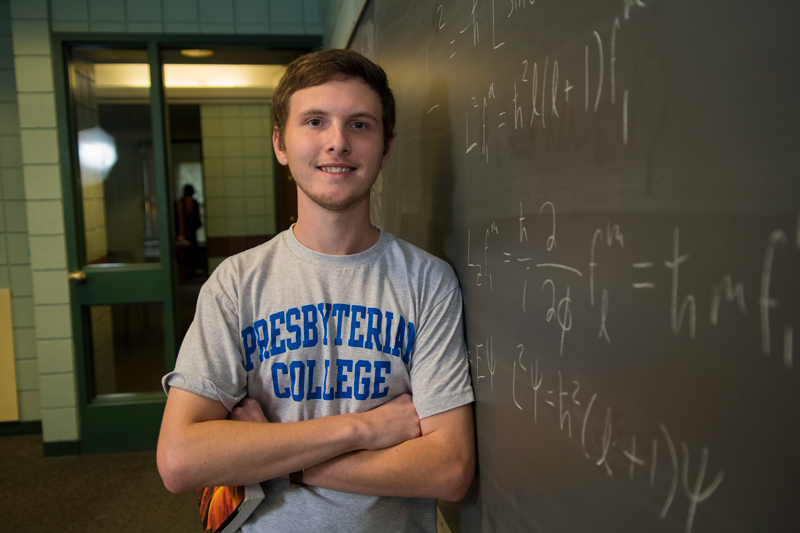Our Homegrown NASA Researcher

Clay Wright, a PC junior from Clinton, has fond memories of go-karts and Nintendo Game Boys when he was a kid. But what he remembers isn’t riding go-karts or his high score on Super Mario Brothers.
“When I was four,” Wright said, “I’d pull apart my family’s go-cart motor and put it back together again, and I did this over and over again. I even took apart my Game Boy one time, just to see what made it work.”
Wright did the same with Legos.
“I always thought I wanted to be an engineer because of Legos. I loved taking things apart and putting them back together,” Wright said.
Fitting In
Wright moved to Clinton in the seventh grade, and his natural curiosity led him to the Science Olympiad program. A friend told him about it the first week he was here. Wright began participating the next year and was a part of the program until his junior year at Clinton High School.
“I have many amazing memories from the program, and I was given extremely valuable opportunities I would have not had otherwise,” Wright said. “I was welcomed by a team of fantastic teachers and coaches who helped guide me through middle and high school.”
Wright said Clinton High School prepared him well overall, aside from participating in the Science Olympiad program.
“I had amazing teachers at Clinton High School in many challenging classes, which helped me figure out my own learning style,” Wright said. “Knowing how to study coming into college is one of the most valuable skills one can have, and CHS helped me with that.”
Why PC?
A student who has been assembling and disassembling Legos, go-karts, and Nintendo Game Boys since he was four years old could have gone to college anywhere. Wright decided to stay in Clinton and go to PC. And why not? He knew he’d be able to keep learning and growing without leaving home.
“I knew that PC’s professors were friendly and engaging from my experiences with the Science Olympiad program,” Wright said. “One thing I had heard from everyone I talked to about PC was that PC has a tight-knit community, so I knew I would meet many supportive people who could challenge and expand my views.”
When he came to PC, Wright thought he wanted to become an engineer. He took a class called Engineering Physics his sophomore year but found out that engineering wasn’t for him.
“I realized I didn’t want to know how to build a bridge,” Wright said. “I wanted to learn about more fundamental and abstract concepts like electricity or quantum mechanics.”
The Next Adventure
The desire to want to know why things work led Wright to majoring in physics. And finding his field has led Wright to his next adventure: research.
The research Wright is conducting is truly out of this world. Wright, along with physics professor Dr. Eli Owens, has been working on a project for NASA. Wright has received the NASA South Carolina Space Grant Consortium Undergraduate Research Award since working on the project.
Wright’s research focuses on a topic that Dr. Owens did his Ph.D. research on: granular materials.
“My research addressed confined granular flow,” Wright said. “In essence, I examined how confined granular flow behaves with different granular materials, such as corn, grain, and rice.”
Most of us, especially those who have never taken go-kart motors or gaming systems apart, wouldn’t know where to start examining how confined granular flow behaves. And Wright even admits the research doesn’t sound exciting at first glance. But it’s real research that NASA will use.
“The findings of my research will help make the transport of granular materials, the second most manipulated substance in industry, safer,” Wright said. “As for the space program, the information gleaned from my research will help influence the ways in which granular materials are transported and manipulated in space.”
Wright is grateful– and somewhat surprised– he’s been able to conduct such research right here at home.
“I was completely unaware that these opportunities existed in Clinton until I came to PC,” he said, “but I have enjoyed working on serious research projects in a town with which I am familiar.”
What’s Next?
Wright hopes to conduct research with the National Science Foundation this summer. He still has ruled out not becoming an engineer, but he’s not quite sure yet what he wants to do after PC. He’s narrowed it down, though.
“I am considering PhD programs in either Physics or Statistics,” Wright said. “I would enjoy a career where I can utilize mathematics, computer programming, and conduct research.”
And just think: It all started with playing with Legos, a go-kart motor, and a Nintendo Game Boy.
